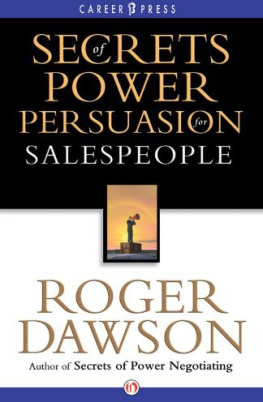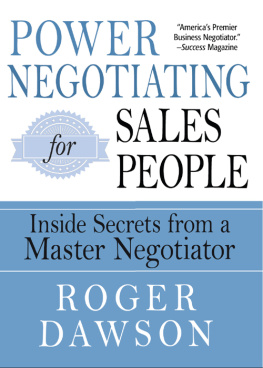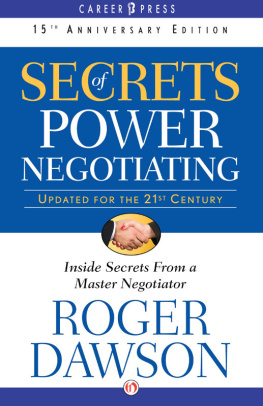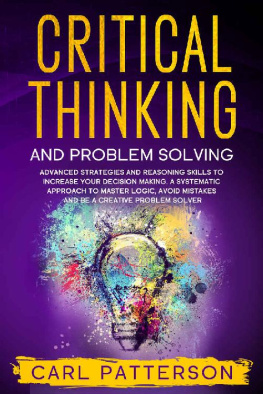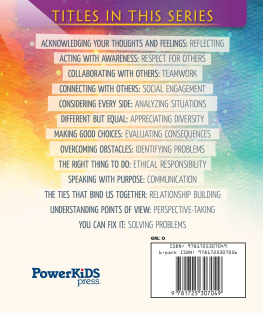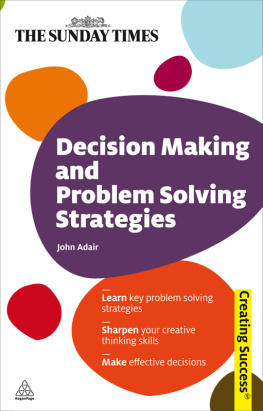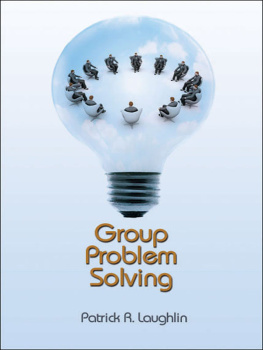Secrets of Power Problem Solving
SECRETS of POWER
PROBLEM SOLVING
by
Roger Dawson

Copyright 2011 by Roger Dawson
All rights reserved under the Pan-American and International Copyright Conventions. This book may not be reproduced, in whole or in part, in any form or by any means electronic or mechanical, including photocopying, recording, or by any information storage and retrieval system now known or hereafter invented, without written permission from the publisher, The Career Press.
SECRETS OF POWER PROBLEM SOLVING
EDITED BY KATHRYN HENCHES
TYPESET BY EILEEN MUNSON
Cover design by Jeff Piasky
Printed in the U.S.A.
To order this title, please call toll-free 1-800-CAREER-1 (NJ and Canada: 201-848-0310) to order using VISA or MasterCard, or for further information on books from Career Press.

The Career Press, Inc.
220 West Parkway, Unit 12
Pompton Plains, NJ 07444
www.careerpress.com
Library of Congress Cataloging-in-Publication Data
Dawson, Roger, 1940
Secrets of power problem solving / by Roger Dawson.
p. cm.
Includes index.
ISBN 978-1-60163-152-7 -- ISBN 978-1-60163-674-4 (ebook) 1. Decision making.
2. Problem solving. I. Title.
HD30.23.D3737 2011
153.43--dc22
2011003529
To my beautiful wife, Gisela,
who brought love
back into my life.
To all the attendees of my seminars,
readers of my books,
and listeners to my audio programs
who shared their problem solving stories with me.
To my three astounding children:
Julia, Dwight, and John.
And to my grandchildren:
Astrid and Thomas.
Section One
Types of Problems
If you only have a hammer, you tend to see
every problem as a nail.
Abraham Maslow
Ten months a year, I travel the country and a good part of the world, conducting seminars for corporations and associations. This means that Ive had a unique opportunity to sit and talk to some of the most successful people in the company. Whenever my schedule permits, I like to have dinner the night before with the president of the company, or the top performer in the association for which Ill be speaking. Its a great opportunity to pick their brains about what made them so successful.
As the topic of problem solving became more and more fascinating to me, I started asking successful businesspeople how they solved problems. How do they go about it in their company? What process do they use?
What I found out was fascinating. Almost nobody has a process for solving problems. I saw people who had built empires, and were respected by everyone in their industry, and people who could commit millions of dollars to a project and not lose a moments sleep over iteven they did not seem to know how to solve problems.
A typical response was A problem comes up, we kick it around, and, if it feels right, we make a move. Isnt that interesting? How much better could they be at what they do, if they just got a little bit better at problem solving?
There is a better way, and the starting point is to change the way you think about problem solving. To become a better problem solver you have to stop focusing on the problem itself, and concentrate on the problem-solving process. With a problem-solving process on which you can rely, you will have the confidence that youre making the right choice, every time.
You may never do the right thing every time, but if youll learn the simple techniques in this book, youll be making the right choice all the time.
In Section One, well talk about the two major types of problems and how to solve them. Later, Ill teach you the specific steps to great problem solving.
Chapter 1
There Are Only Two Types of Problems
If you break your neck, if you have nothing to eat, if your house is on fire, then you have got a problem.
Everything else is inconvenience.
Robert Fulghum
The first step to solving your problem is to decide whether the problem is about money or people. There really are only two different kinds of problems: money problems and people problems. That doesnt sound right to you, does it? Its got to be more complicated than that, you say.
I still remember where I was when I first heard that there are only two kinds of problems. I was living in Bakersfield, California, and somebody suggested that I try attending the Church of Religious Science. When they told me that it wasnt a Christian church I was skeptical. I was raised Church of England (Anglican in the United States), and my first wife was raised Lutheran. Both believe in a strict agenda in church services and sermons taught straight out of the Bible. A church that taught that there are many paths to God and that powerful thinking could change circumstances seemed more like a motivational rally than a religion.
Sitting in this strange environment with my family I was frankly suspicious and looking for reasons to rule Religious Science out of our lives. When the preacher told that us he was going to talk to us about problem solving, it was definitely not the kind of topic that Id heard from my vicar back home. Then he made the statement that there are only two types of problemspeople problems and money problemsand I was convinced that it was sheer baloney. But that was more than 30 years ago and Ive never found an exception to that rule.
Dont confuse people problems with money problems
Believe me when I tell you that youll never find a problem or opportunity that cant be separated this way. Money problems or people problemsthere are only two kinds. Or possibly solving the problem will take both money, and people handling skills. People have difficulty solving problems when they confuse the two:
I own a chain of 60 two hamburger stands in New Jersey. I started it right out of high school with a thousand bucks I borrowed from my uncle. I built this business with sweat and tears. For three years I worked 18 hours a day seven days a week until I could afford to hire some help. My problem is with that first employee. Hes now my executive vice-president. I made this guy. I took him off the street, and now he lives in a mansion and drives a Mercedes. Yesterday, hes got the gall to tell me that hes quitting me and going to work for the competition. How could he do this to me, after all Ive done for him? I asked him if hed stay for more money. He says sure, but he wants fifty thousand more a year! Thats blackmail!
This is an example of a person who really has a money problem, not a people problem. If he could only see this clearly, hed calm down, and know how to negotiate a solution to the problem. He should be calmly thinking, Okay, so I can solve this problem for $50,000 a year. But, I know I can do better than that. Fifty thousand is unreasonable and he knows it, so he must be upset about something else. Well talk, Ill butter him up, and well work it out. Its probably not going to cost me anymore than $10K and a new car.
Heres a problem that I hear all the time:
My 25-five-year-old son is driving me insane. I love him, but I cant stand him living at the house anymore. Hes driving me crazy with his late-night carousing. Ive tried laying down ground rules, but nothing seems to work. I ought to throw him out of the house and let him make his own way in the world. It would probably do him a world of good. But I hate to break the ties completely. Hes my only son, and I might never see him again.
Next page

